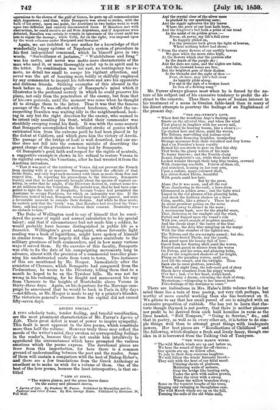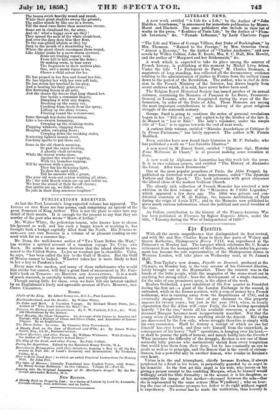an's/cr . rorraY. * A FINE scholarly taste, tender feeling, and tuneful
versification, are the most prominent characteristics of Mr. Farrar's Lyrics of Li e. Their great defect is want of power to inspire sympathy. fault is most apparent in the love poems, which constitute more than half the volume. However truly these may reflect the moods of the writer's mind, they awaken no corresponding feelings in the reader's, because they do not enable him intuitively to apprehend the circumstances which have prompted the various emotions which the poems express. The devotional pieces are freer from this imperfection, for here there is a common ground of understanding between the poet and the reader. Some of them will sustain a comparison with the best of Bishop Heber's, and there are a few translations from the Greek Anthology so excellent as to make us wish for a volume of them. One of the best of the love poems, because the least introspective, is that en- titled
" LIFE AT Ellin.
" The waters glance, and the green leaves dance On the sunny and pleasant shores, * Lyric:* of Life. By Frederic W. Farrar. Published by Macmillan and Co. Pastoral and other Poems. By Mrs. George liaise. Published by Harrison 56, Pall Mall.
And the crystal clear of the silver mere Is plashed by our sparkling oars ; And the ripple upheaves the lily leaves Where the prow of our boat bath been, And the foxglove's bed bath a print of our tread
In the midst of its golden green:—
Nero; oh never, my life's full river So happily glided on, For thy presence hath given the light of heaven, Where nothing before had shone.
" From the starry flowers of our earthly bowers We gaze when the morn rides high, At the flowers which star the gardens afar In the depth of the purple sky ; And the days are calm, and the nights are balm, And the crowned hours are free But the brightest gem of their diadem
Is the thought and the sight of thee:—
Ever, oh ever, may life's full river As happily glide along, For sad is the sigh of a broken heart In lieu of a flowing song."
Mr. Farrar always pleases most when he is forced by the na- ture of his subject out of his excessive tendency to prefer the ab- stract to the concrete. Thus there is more of human interest in his treatment of a scene in Grecian fable-land than in many of his direct attempts to pourtray the feelings of an Englishman of the present day.
"THE 8EA-24111MPH'S LOVE.
" When first the wondrous Argo's flashing oars Smote on the silvered blue, and when the wind First played in laughter with her snowy sail, And curved its heaving bosom, like a swan's ;— Up-started here and there, amid the waves, The Tritons, marvelling and jealous-eyed Astride their flouncing dolphins, trumpeting Strange murmurs from their wreathed and rosy horns. And e'en Poseidon's hoary royalty
Reined his sea-steeds to gaze on that fair ship
That broke the glassy waters of his main To foamy furrows ; and the Nereids clung Round Amphitrite's ear, while their dark eyes Looked wonder through their long blue tresses, crowned With clustering sea-bells. Fairest of them all, And stateliest, leaning on her rosy arm, Upon a radiate, many-coloured shell, Lay silver-footed Thetis, beautiful With pearls amid her hair. But by the prow, Alone (for it was noon, and all the rest Were slumbering in the cool), a hero-form Glimmered in golden arms ; and the light wind Lisped in the red plumes of his glancing helm, And shook the feathery shadow on a brow Calm, marble, like a prince's. There he stood In silent grandeur gazing on the scene
That died away to silence in the noon
A murmurous hush, save for the playful wave, That, flickering in the sunlight and the wind, Patted and flapped upon the vessel's side With low, sweet sounds of laughter musical ; And the clouds slept i' the lustre of the blue Of heaven, the deep blue mingling on the merge With the blue slumber of the lighted sea.
The Tritons and the sea-nymphs passed; but she, The silver-footed Thetis, saw the youth, And gazed upon his beauty full of love : Gazed from her floating shell amid the waves, Floated and gazed in silence from the waves On Peleus, and his arms, and glancing helm, And on the lengthened shadows of his height, Flung on the purpling waters, until eve, And till the sunset, and the twilight. Then Sank she to coral grottoes, jewel-lit, Where, all night long, the soft-eyed god of sleep Shook dewy slumbers from his poppy wreath
O'er her ; and, o'er her head, aerial-hued,
Waved many a dream, colouring the dark of sleep, Mysterious,—whispering to her inmost heart Fore-feelings of the destinies to come."
There are indications in Mrs. Halse's little volume that in her mind there lies a vein of true poetry, not very rich perhaps, but worthy of more careful working than she has bestowed on it. We grieve to say that her small parcel of ore is mingled with an excessive proportion of rubbish. She has yet to learn that rhe- toric though rhymed is not poetry, that there is neither pleasure nor profit to be derived from such bald homilies in. verse as the lines headed, " Evil Tempers," " Going to Service," and that in poetry, as well as in every other art, it is better to do sim- ple things well than to attempt great things with inadequate powers. Her best pieces are "Recollections of Childhood "- and the following, which displays a fresh and lively fancy, though one idea in it is borrowed from the Talking Oak of Tennyson.
"THE wimp MARCH WINDS.
" The wild March winds are up and before us, We hear the sound of their far-off chorus ; Our spirits are up, we follow after,
To join in their deep sonorous laughter. We will follow the winds' fantastic brood— They suit with the bent of our fitful mood.
Uttering shouts of gladness, Muttering wails of sadness, Over the bridge like hooting owls, Under the arch with sullen growls, Down the river with a sweep Where the willow branches sleep ;
Some on the topmost boughs of the trees, Singing and swinging in thoughtless ease. The wild March winds are up on the hill, Turning the sails of the old white mill,
The beams swish heavily round and round, While their giant shadows sweep the ground; The miller stands by like one in a dream, Till the meal runs faster than mountain stream. Some are in cloudland far, far away, And oh! what a happy crew are they ! They spread the sails of the white cloud-boat, And over the deep deep blue they float, To the sun-gilded islands as they lay Deep in the mouth of a slumbering bay, Where the giant clouds encompass them round, Like Alpine peaks by a snow-storm crowned. Some are trailing vapory veils From hill to hill across the dales ; Or making rents, to bear away The fragments in their restless play. One, and a merry rogue is he, Chases a child across the lea.
He has peeped in her face and found her fair, He has blinded her with her own soft hair, He has stolen her kerchief in his play, And is bearing his fairy prize away ; Her fluttering bosom is all astir, And she chases the breeze that long chased her.
One beside a streamlet lingers, Dimpling it with airy fingers, Breaking up the sunny ray, Catching foam-beads from the spray, Lifting up the slimy tresses, Floating round the watereresses.
Some through key-holes thrumming, Like a bee-swarm humming,
Creeping up the creaking stairs, Flapping windows, clapping doors, Heaping ashes, sweeping floors' • Creeping down the creaking stairs, Scattering lighted brands about, Catching sparks to put them out.
Some in the old church moaning, Or past the organ droning, A ghostly choir intoning, While the sexton works alone.
Against the windows tapping, With ivy branches rapping, Till he answers with a moan.
They fan his flickering light, To daze his aged sight, Till he answers with a groan, The poor old worn-out sexton working all alone. Ho ! the wild March winds are up and before us, We hear the sound of their far-off chorus ; Our spirits are up, we follow after, join oin in their deep sonorous laughter."



























 Previous page
Previous page